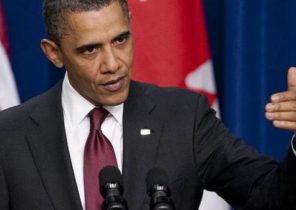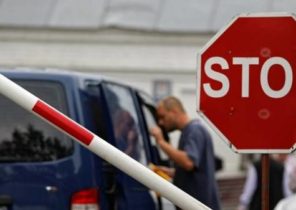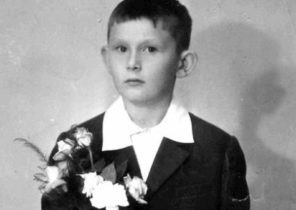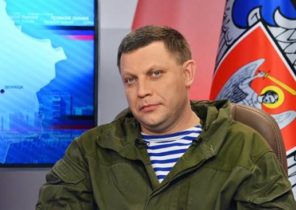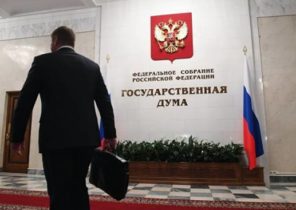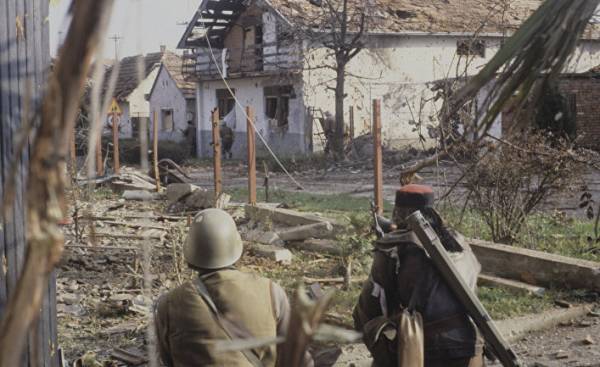
Ukraine is not the first state of Europe, faced with the problem of the temporarily occupied territories. There are those who for decades could not return their lands, but there are success stories, and ended with the reintegration. In the Ukrainian media, in the discussions of politicians and experts often think about the successful Croatian experience.
Of course, first of all think of the military liberation operation “Lightning” and “Storm” in early may and early August 1995, which allowed thanks to a well planned and resourced action to return the vast majority of the territories occupied back as far as 1991.
Therefore, on August 5, the day of the operation “Storm”, is celebrated annually in Croatia on the state level as a celebration of the victory in the great Patriotic war (and neighbouring Serbia at the same time, held a memorial event for the victims of war and refugees from Croatia).
But Ukraine, which also wants to return the occupied territories, need to know what preceded this date and what the country went through after it. So, on August 5, 1995 seems to be a fair victory to knock on the doors of the country who fought to the death for the preservation of its state sovereignty and territorial integrity.
It would seem that the international community and the civilized world was in the beginning of the conflict to help Croatia to defend its independence in accordance with the norms and principles of international law…
But life was very difficult, and often tragic. And this experience should take into account all those involved in such an important topic as the return of the temporarily occupied territories. Almost every Croat who fought in the war, will tell you that you must rely primarily on themselves.
If you ask Croats about the use of peacekeepers in the war, the review will be something like this: they are more hindrance than help. We are talking about what peacekeepers actually fixed the line of demarcation of Croatian troops and temporarily occupied by separatists territories, but the international mandate, and sometimes the political will to return to Croatia of these territories was not.
Of course, this applies only to problems of military reintegration, because with the civilian component, all otherwise. Without the international community the return of the temporarily occupied territories by peaceful means would be impossible.
But back to the question, what useful experience of Croatia for Ukraine? Are there similarities in situations developing with the difference in 20-25 years? The author of these lines has no doubt: the Croatian experience, of course, deserves careful study and use of the Ukrainian side. No wonder Moscow began to be so nervous when Croatia started cooperation with Ukraine on this issue.
We are talking about the visit to Kiev, the Croatian Prime Minister Andrei Plenkovich in November 2016, where he expressed the readiness of Ukraine to transfer experience (attention!) the peaceful reintegration of the temporarily occupied territories.
Then the Russian foreign Ministry and Ambassador in Croatia his demarches tried to raise a political storm, deliberately mixed up the issue of military reintegration and peace, which is in Kiev, said the Croatian Prime Minister.
To overcome the Informatica, it took a lot of work to do. By the time the Ukrainian position has dominated the media space of a foreign state (unfortunately, now the situation has changed, Croatia is emerging Russian information dominance, but this is a topic for another article).
And Croatian experience of victory in the great Patriotic war tells about the necessary superiority over the enemy in the media struggle. And not just in private, but most importantly in the international information space.
So, in the early 1990s, before the fighting, the aggressor has made a media offensive against Croatia. On TV channels that are frequently watched by the Croatian audience, was the flow of misinformation about the actions of the official Croatian authorities. Aggression has accused the Croatian side, which at the time barely fought off the attackers. The state elite and all who support it, was accused of fascism (us is something like, isn’t it?) Nothing surprising. Just in the former Yugoslavia already used Soviet developments on hybrid warfare.
First, there are checkpoints in the areas of compact residence of national minorities, from neighbouring countries were arriving volunteers (there are no historically Cossacks, so they were replaced by football fans), followed by military personnel.
The minority receives weapons from those who fueling the conflict, and at some point it becomes military-separatist majority.
All these actions were supervised by the Russian General staff and foreign intelligence, the Yugoslav direction which was headed by promising Lieutenant General Sergei Ivanov, future Vice-Premier and Minister of defense, and during the attack of Russia to Ukraine — the head of Putin’s presidential administration. So do not be surprised by the similarities in the scenarios of the organization of the war in Croatia and Ukraine.
To compromise the Croatian volunteers prepared a lot of fakes, in particular of the defenders of Vukovar had prepared a report that they murdered little children, cut off his toe and made a necklace.
Here’s a variation on the theme of the crucified boy. The theory of information warfare teaches that a hundred well prepared propaganda articles or television coverage is more effective than a hundred of the most modern tanks.
For Ukraine, this lesson means that in addition to the construction of “Strongholds” for the army we need to adopt best practices to counter Russian information aggression. Must always cook and serve high quality information product in the temporarily occupied territories.
The struggle for the minds of people in the occupied part of Donbass should go continuously. The Croatian experience is reminiscent of another important factor in the victory — morale troops.
It is clear that when protecting your home, your family, the integrity of the fighters have high motivation. Former Croatian soldiers will tell you on the permanent moral superiority in the struggle with the enemy, although in the first year of world war II was a huge problem with supplies of weapons, and then the enemy could tactically to win.
At this time it had an international embargo on arms supplies to a conflict region, so that the Croats had to find covert channels, CH. A significant contribution was made by the world the Croatian Diaspora, which was transferred to Zagreb a lot of money (as you can see, the analogy with Ukraine is really a lot!) Back to the question of morale.
We need to look at the issue of post-traumatic stress disorder (PTSD) among soldiers and the civilian population from the front line. In the active phase of the conflict, this problem is invisible. But as soon as there is a peaceful lull, the human body can finally relax, and then start a huge problem.
Some soldiers suffering from PTSD, commit suicide. Were acts of suicide, in which Gib and the surrounding. There are numerous non-combat losses…
Croatia did not immediately recognize the magnitude of the problem of PTSD. Some generals objected, saying that as a fighter, a patriot, a hero of the Fatherland may have a mental illness? But then when the suicide has affected even the military command, the problem was solved at the state level, creating a group of military psychologists and psychiatrists. Research has shown that every seventh fighter sooner or later will experience PTSD.
Among the soldiers who received wounds of moderate or severe degree, the percentage of incidence of up to 43%. And it is not an incurable problem: the sooner PTSD is diagnosed, the more successful the treatment. Ukraine needs to learn from the Croatian experience; even under my leadership, the Embassy initiated the visit to Croatia teams of military psychologists and psychiatrists of Ukraine.
Very responsibly to this problem was approached by the leadership of the National guard. The Croatian experience of dealing with PTSD is to put on stream the Ministry of defense.
Another important factor of the Croatian victory — the dynamic growth of the economy during the war. In the end, the armed conflict has its costs that you need to pay. Better than the enemy, funding for military units creates the foundations for future victory.
To overcome the catastrophic situation after the occupation in late 1991, 26% of Croatian territory was established the government of national salvation, which included the representatives of all political forces in the country. This government has worked for year, but have been able to effectively translate the economy on a war footing, to stop the decline of the main industrial and agricultural indicators, to ensure effective management of state-owned enterprises and encourage private companies to work with complete dedication to national interests. That is, in a short time the economy has forced to grow. And now to the other factors that helped the military reintegration of the temporarily occupied territories.
It is important to understand that military means was returned to the territory, located far from the Croatian-Serbian border. Perhaps, it is obvious that it would be easier in a military sense to return the territory, which hosted the terrorists, if they had direct access to the Russian border.
Of course, there were corridors linking separatist territory of Serbia, but they were narrow, could be exposed, therefore, to compare them with the geographical location of the so-called “L/DNR” is incorrect.
There is another factor of the Croatian success. The leaders of the Serbian separatists in Croatia and Bosnia (Milan Martic and Radovan Karadzic), a kind of Carpenter’s and Zakharchenko on the eve 1995 fell out with Serbian President Slobodan Milosevic. Even then, Belgrade has reduced the help of puppet armies in the occupied territories.
In addition, during the period when the Croatian army was preparing for the final liberation operation “Storm”, the top political leadership of Croatia knew that the troops from Serbia will not go to help the separatists. The fact that Milosevic had received assurances from influential international players about the failure of his responsibility for the war, if he ceases to provide military assistance to the Serbs in Croatia and Bosnia. And then there’s the arrogant behavior of Karadzic and Martic…
Therefore, when the Croat army launched a large-scale liberation operation, the headquarters of the separatists took from the safe in Belgrade sealed envelope — official plan against the Croatian offensive. The researchers argue that these directives contain only one word: “fall Back”.
This completely demoralized the leaders of the so-called Republika Srpska Krajina (the Croatian equivalent of “L/DNR”). The civilian population was ordered immediately pack your things and go to the Serbian border. An army of separatists had only sporadic resistance.
The Croatian military then deliberately opened the corridors for the passage of the civilian population and want of the army. This ensured the Croatian side a quick and relatively bloodless final victory.
Translated into Ukrainian is if Putin refused to support ORDA during the liberation operations of the AFU in exchange for the lifting of sanctions or guarantees the involvement of the international court of justice.
While this all sounds absolutely incredible. But who knows…
However, it is difficult to argue that here, that is the key issue, Ukrainian, and Vietnamese scripts are too much different.
Another important detail: no political force in Croatia does not advocate the separation of the separatist territories.
If Ukraine sometimes we hear such ideas from politicians, in Croatia, no one even had not thought of it. It’s in Croatian understanding is complete idiocy, because for every piece of its territory, the Croats fought for centuries, and to give them a betrayal of the highest order! Even if the local Serbs in those territories took up arms against the Croatian state.
The Croatian experience also teaches that there are always scoundrels who in war and human suffering make a lot of money. Therefore, politicians should realize that this category of people will play for a long conflict. And finally, one more important detail. The conflict in Croatia had obvious signs of ethnic and religious clashes of Serbs with Croats, Orthodox Catholics.
In Donbass, we have the opposition of more ideological character, without a clear distinction on religious or ethnic grounds.
Perhaps it eases our situation, because for the life of the people may revise their beliefs and values, but very rarely change their nationality or religion.


